
Jean Marie Lucien Pierre Anouilh was a French dramatist and screenwriter whose career spanned five decades. Though his work ranged from high drama to absurdist farce, Anouilh is best known for his 1944 play Antigone, an adaptation of Sophocles' classical drama, that was seen as an attack on Marshal Pétain's Vichy government. His plays are less experimental than those of his contemporaries, having clearly organized plot and eloquent dialogue. One of France's most prolific writers after World War II, much of Anouilh's work deals with themes of maintaining integrity in a world of moral compromise.
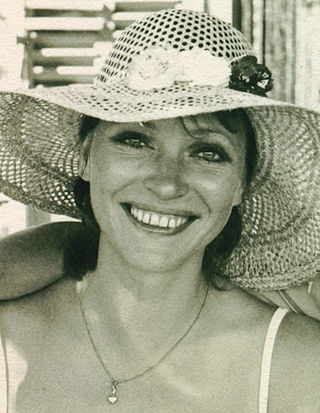
Anna Karina was a Danish-French film actress, director, writer, model, and singer. She was an early collaborator of French New Wave director Jean-Luc Godard, her first husband, performing in several of his films, including The Little Soldier (1960), A Woman Is a Woman (1961), My Life to Live (1962), Bande à part, Pierrot le Fou (1965), and Alphaville (1965). For her performance in A Woman Is a Woman, Karina won the Silver Bear Award for Best Actress at the Berlin Film Festival.
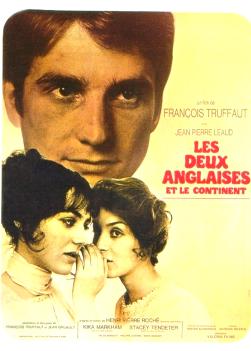
Two English Girls, is a 1971 French romantic drama film directed by François Truffaut and adapted from a 1956 novel of the same name by Henri-Pierre Roché. It stars Jean-Pierre Léaud as Claude, Kika Markham as Anne, and Stacey Tendeter as Muriel. Truffaut restored 20 minutes of footage, which fills out the characters, before his death in 1984.
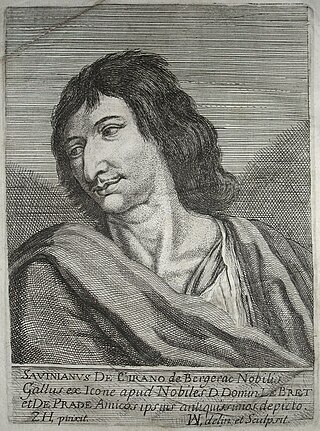
Cyrano de Bergerac is a play written in 1897 by Edmond Rostand. The play is a fictionalisation following the broad outlines of Cyrano de Bergerac's life.

Valérie Quennessen was a French theatre and film actress.
Invitation to the Castle is a 1947 satirical play by the French playwright Jean Anouilh. It was adapted in 1950 by Christopher Fry as Ring Round the Moon. The play concerns twins, a cold, manipulative playboy Hugo, and his sensitive brother Frédéric. Frédéric is madly in love with Diana, the spoiled daughter of a self-made millionaire. She herself wants Hugo, as his impenetrability teases her. To show to Frédéric that Diana is not worth his attentions, Hugo invites to a ball Isabelle, a lower-class dancer, whom he Pygmalion-like transforms into an aristocratic beauty.
The Waltz of the Toreadors is a 1951 play by Jean Anouilh.

Princess Isabelle Françoise Hélène Marie d'Orléans was a member of the House of Orléans and, by marriage, a member of the ducal Harcourt family and of the princely House of Murat.

Muriel is a 1963 French psychological drama film directed by Alain Resnais, and starring Delphine Seyrig, Jean-Pierre Kérien, Jean-Baptiste Thiérrée, and Nita Klein. Its plot follows a middle-aged widow in Boulogne-sur-Mer and her stepson—recently returned from military service in the Algerian War—who are visited by her ex-lover and his new young girlfriend.
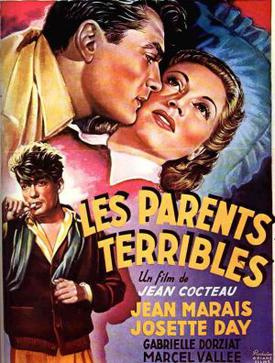
Les Parents terribles is a 1948 film adaptation directed by Jean Cocteau from his own stage play Les Parents terribles. Cocteau used the same cast who had appeared in a successful stage revival of the play in Paris in 1946. The film has sometimes been known by the English title The Storm Within.

Beyond the Clouds is a 1995 Italian-French-German romance film directed by Michelangelo Antonioni, with contributions by Wim Wenders, and starring John Malkovich, Sophie Marceau, Vincent Perez, Irène Jacob, Fanny Ardant, Jeanne Moreau, Peter Weller, Marcello Mastroianni, and Jean Reno. The film consists of four stories of romantic love and illusion told from the perspective of a wandering film director. In the first story, two beautiful young lovers are unable to consummate their passion because the young man desires impossible perfection. In the second story, the director makes love to a young woman who reveals that she murdered her father. In the third story, a man makes an effort to appease both his wife and his mistress. In the fourth story, a young man is infatuated with a girl who is about to enter a convent. This was the final feature-length film by Antonioni before his death in 2007.

In Case of Adversity is a 1958 French-Italian crime film directed by Claude Autant-Lara and starring Jean Gabin, Brigitte Bardot and Edwige Feuillère. It was released as Love Is My Profession in the United States. It tells the story of a married lawyer who rigs a trial to acquit a young female criminal he has become obsessed with, even to the point of imagining they might have a life together and start a family. The screenplay was written by Jean Aurenche and Pierre Bost after the novel In Case of Emergency by Georges Simenon. The film was released in France on 17 September 1958.
Barbara Bray was an English translator and critic.

Ondine is a play written in 1938 by French dramatist Jean Giraudoux, based on the 1811 novella Undine by the German Romantic Friedrich de la Motte Fouqué that tells the story of Hans and Ondine. Hans is a knight-errant who has been sent off on a quest by his betrothed. In the forest he meets and falls in love with Ondine, a water sprite who is attracted to the world of mortal man. The subsequent marriage of people from different worlds is, of course, folly.
Ardèle ou la Marguerite is a 1948 play by French dramatist Jean Anouilh. It was the first of his self-styled pièces grinçantes – i.e., 'grating' black comedies. According to Anouilh's biographer Edward Owen Marsh, "In this angry, pessimistic work Anouilh shows himself a master at the height of his powers in every aspect of his craft... Ardèle is a terribly bitter play, but it holds the imagination as a piece of poetic theatre."

Léocadia is a play by Jean Anouilh that premiered at the Théâtre de la Michodière in Paris on 2 December 1940. It is one of Anouilh's Pièces roses, together with Humulus le muet (1932), Le Bal des voleurs (1938), and Le Rendez-vous de Senlis (1941). For the occasion, Francis Poulenc composed one of his most celebrated songs, "Les Chemins de l'amour", sung by Yvonne Printemps.
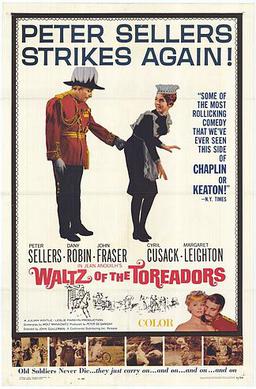
Waltz of the Toreadors is a 1962 film directed by John Guillermin and starring Peter Sellers and Dany Robin. It was based on the play of the same name by Jean Anouilh with the location changed from France to England. It was nominated for a BAFTA Award for Best British Screenplay, in 1963.

Le financier et le savetier is a one-act opérette bouffe of 1856 with words by Hector Crémieux and Edmond About, and music by Jacques Offenbach, based on the poem by La Fontaine. In 1842 Offenbach had set The Cobbler and the Financier among a set of six fables of La Fontaine.
Roland Piétri, was a French actor and theatre director.

Michel-Marie Poulain was a French transgender performer and self-taught painter whose work was influenced by Matisse and by Raoul and Jean Dufy, and whose style and technique were compared to those of Bernard Buffet and Marc Chagall.














